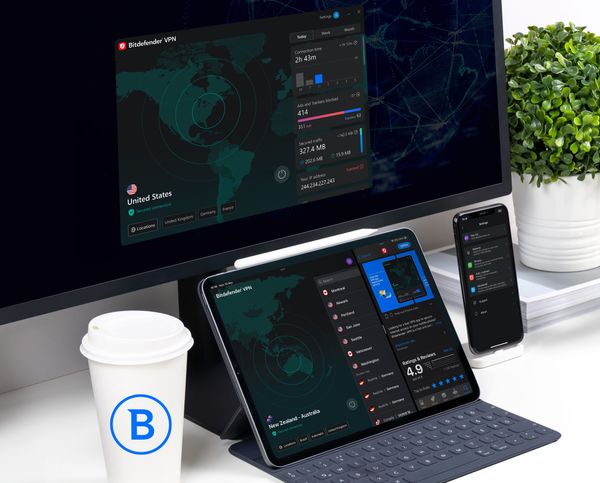How to Protect Your Privacy if Your VPN Connection Fails

Government surveillance, data breaches and targeted attacks on regular Internet users have led many to embrace the idea of protecting their online privacy.
VPNs are among the most reliable privacy tools. They hide your online activity from prying eyes by redirecting your traffic through a secure tunnel while obfuscating it with impenetrable encryption algorithms.
However, sometimes your VPN connection may suddenly drop, which could expose your identity. Even if it lasts just a split second, a disconnection could compromise your identity by leaking personally identifiable data to third parties such as surveillance agencies, your ISP, hackers or online tracking services.
What happens if your VPN connection fails
Your VPN could disconnect for various reasons. Technical difficulties, poor Internet connection, subpar hardware or even a cyberattack could sever your connection to the VPN server.
Whether Android phones, Windows PCs or iPhones, many devices are configured by default to automatically connect to the next available network if the current one drops.
In other words, if your VPN connection fails, your device will most likely look for the next available connection and use it to get back online. While seemingly convenient, this feature can also jeopardize your privacy by reconnecting you to an unsecured network.
To make matters worse, this usually happens in the background, so users are often unaware that their VPN connection failed and their device has reverted to their default, unsecured connection.
Many entities actively monitor and log connections, so even the tiniest slip could reveal sensitive details about your activities to unwanted agents.
The importance of a kill switch
Many reputable VPN services include an Internet kill switch to prevent data leaks caused by VPN disconnections. This feature temporarily blocks all Internet traffic if the VPN connection accidentally drops.
The kill switch ensures that your device won’t use its default, unsecured connection to get back online, keeping your data safe from inadvertently leaking to third parties.
Depending on your connection type, a VPN can give you system-wide or app-specific protection. You can configure your VPN to tunnel all traffic on your device or only cloak specific parts by excluding certain apps or services.
The same goes for the kill switch; if the app supports the feature, you can exclude apps or websites from the tunnel. If the VPN connection drops and the kill switch restricts unprotected Internet traffic, the whitelisted services can remain online through your default, non-VPN connection.
Installing a VPN on your router
Setting up a VPN on your router has several benefits, such as not having to worry about a kill switch, using several devices on one VPN subscription plan, and having a secure exit point for all your connections.
It also eliminates the need to remember to connect to your VPN every time you boot your device. Once you’ve configured the router VPN, all the devices using the router to get online will be protected by the VPN’s tunnel.
However, there are also some drawbacks. For starters, not all VPN services provide router support. At the same time, not all manufacturers support OpenVPN, making it impossible to configure a VPN.
Furthermore, using a VPN on your router will split the bandwidth between all connected devices, which may lead to slow connection speeds. Lastly, configuring a VPN on your router could prove challenging, especially if you’re not tech-savvy. If the risks outweigh the benefits, using VPN software and toggling the kill switch may be safer to prevent accidental data leaks.
Manually configuring apps
Some apps, such as torrenting clients, encompass dedicated privacy protection features that automatically prevent incoming or outgoing traffic if the selected connection drops.
The feature, often referred to as IP address binding, allows you to select an IP address or a network interface to link the program to. If the IP address becomes unresponsive or the interface no longer functions, the app will block all traffic until the connection to the chosen element is re-established.
Although torrenting is commonly associated with illegal activities such as piracy or sharing illicit content, many legitimate services use torrenting for convenient, fast data sharing. Considering that torrenting traffic can be easily identified in a data stream, it makes sense that users should be extra careful about their privacy when using Peer-to-Peer (P2P) or torrenting clients.
For various reasons, many VPN services frown upon torrenting while connected to their servers. The most common ones include:
- Keeping tabs on every customer’s activity and the legitimacy of the shared content can be challenging (and also a red flag if the service claims to abstain from such practices)
- Torrenting usually sees vast amounts of data exchanged, which could affect the quality of service for other users connected to the same server
To get a better grip on torrenting, some services offer specialized P2P servers and restrict torrenting traffic on every other server. However, services such as Bitdefender VPN provide a safe environment for P2P/torrent users by allowing torrenting on all servers.
It also has a built-in feature that automatically establishes a secure connection when it detects a P2P app being launched.
Sometimes VPN connections fail
To wrap it up, while VPNs are, without a doubt, one of the safest ways to guard your online privacy, sometimes even these may fail. The good news is that, in most cases, these disruptions are temporary and usually benign. Choosing a trustworthy service and adequately configuring it could help avoid accidental data leaks, even if your VPN connection drops.
tags
Author

Vlad's love for technology and writing created rich soil for his interest in cybersecurity to sprout into a full-on passion. Before becoming a Security Analyst, he covered tech and security topics.
View all postsRight now Top posts
Outpacing Cyberthreats: Bitdefender Together with Scuderia Ferrari HP in 2025
March 12, 2025
Streamjacking Scams On YouTube Leverage CS2 Pro Player Championships to Defraud Gamers
February 20, 2025
How to Identify and Protect Yourself from Gaming Laptop Scams
February 11, 2025
Your Device ‘Fingerprint’ Will Go to Advertisers Starting February 2025
December 24, 2024
FOLLOW US ON SOCIAL MEDIA
You might also like
Bookmarks








